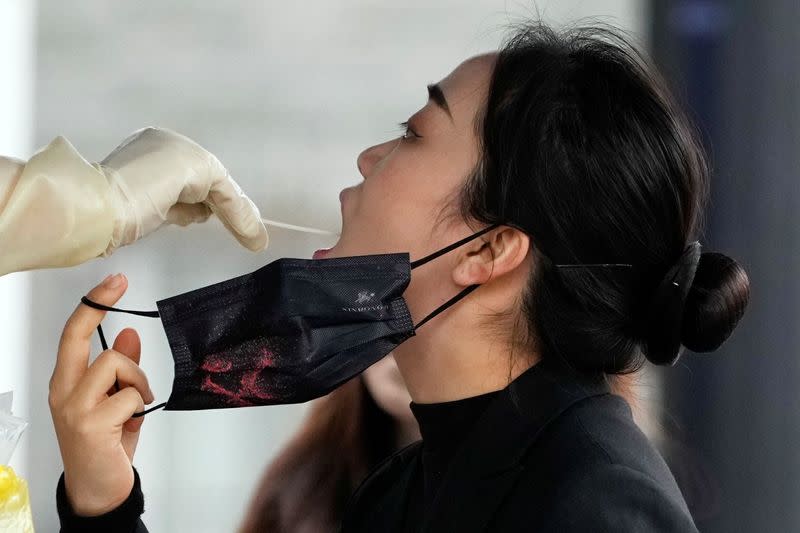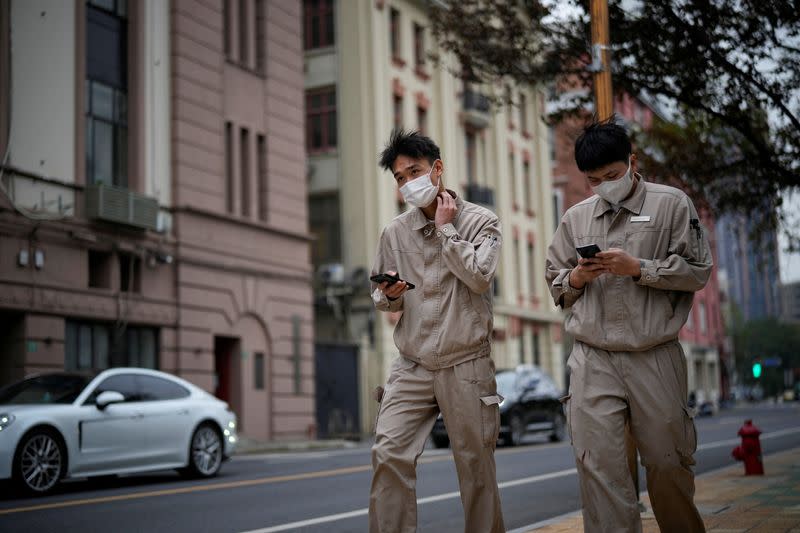Factbox-China's rigid zero-COVID-19 policy starts to thaw
BEIJING (Reuters) -China unveiled new measures to ease some of the world's toughest COVID-19 curbs on Wednesday, after three years of a "zero-COVID" policy that triggered widespread protests and hammered the economy.
What do the measures mean?
IS CHINA ABANDONING ZERO-COVID?
Beijing has not officially said it is ending its zero-COVID policy, but the adjustments are the clearest sign yet China is quickly pivoting away from that policy and towards letting its people live with the disease.
Health officials are still warning that trends in fatalities will be closely watched in case a return to tougher measures is needed.
Over the past few weeks, authorities have made varying policy changes in cities such as Guangzhou and Beijing, despite recent record infections.
Officials had earlier told local governments not to use a "one-size-fits-all" approach and health authorities reinforced that tune again, but most notably calling out "bureaucracy".
Cities are now required to just close off apartments and affected floors, rather than entire city blocks.
WHY MAKE CHANGES NOW?
Public fatigue with zero-COVID had reached boiling point, from worker unrest at iPhone maker Foxconn in the central Chinese city of Zhengzhou to riots in southern Guangzhou.
The world's second-largest economy has released tepid or disappointing economic data over the year, hit by curbs that have squeezed consumption and travel and disrupted factory output and global supply chains.
WHAT IS CHINA DOING TO PREPARE FOR EASING?
It recently said it would increase vaccination rates among its elderly population. Some cities have rolled out a vaccine booster from CanSino Biologics that can be inhaled.
China has also ramped up vaccine approvals, with state media saying four had been cleared since Sunday and one report saying 13 were ready for emergency use.
Some experts had urged more vaccine booster doses, as herd immunity is low after the virus was largely kept at bay during the pandemic's first two years.
But China has not approved foreign mRNA vaccines that are more effective. A top U.S. intelligence official recently said President Xi Jinping is unwilling to accept Western vaccines.
HOW HAVE THE PUBLIC REACTED TO THE CHANGES?
With jubilation, especially in big cities, frustrated by the inconvenience, uncertainty, economic toll and travel hurdles that came with zero-COVID.
Experts say fear around the virus varied widely around the country, but people were also learning that it is not that deadly. But there has also been a run on medicines. Health authorities warned of tight supplies and there have been reports of price gouging.
Older people also worry about the cost of any wider outbreak. State media has played up deaths and chaos elsewhere, especially in the United States.
WHAT DO THE CHANGES MEAN FOR FULL RE-OPENING?
Many analysts had been pointing to a March or April re-opening. China has all but shut its borders to international travel for nearly three years. International flights are still at just a fraction of pre-pandemic levels and arrivals face eight days in quarantine.
Bank Goldman Sachs said it expects gradual re-opening from April and JPMorgan analysts have warned the path to re-opening is likely to be bumpy.
Lockdowns closed global firms that make everything from cars to cell phones. Travel and leisure stocks jumped on the latest news.
Also, time will tell with the winter flu season and the annual session of parliament that usually starts on March 5.
(Reporting by Beijing and Shanghai newsroom, Writing by Bernard Orr; Editing by Nick Macfie and Andrew Heavens)

 Yahoo Movies
Yahoo Movies 

